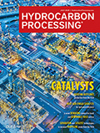Octane
Show Preview: IRPC Process Technology
IRPC Process Technology: The latest advancements in process technologies
Editorial Comment
Over the past several decades, the hydrocarbon processing industry has invested heavily in new processing units to produce low-sulfur and ultra-low-sulfur (ULS) transportation fuels.
Meeting the Tier 3 challenge with ultra-clean alkylate
The U.S. Environmental Protection Agency (EPA) introduced Tier 3 gasoline sulfur standards in 2017, requiring all U.S. gasoline producers to adhere to an annual 10-ppm average sulfur limit.
Reducing acid consumption: Maximizing sulfuric acid alkylation unit profitability
Alkylation is a process used to produce highly branched isoparaffins from the reaction of lighter olefins and isobutane in the presence of sulfuric acid as a catalyst.
Construction
TechnipFMC has begun construction on Assiut National Oil Processing Co.’s new hydrocracking complex in Egypt.
FCC NOx reduction methods: Complying with regulations without capital investment
As fluid catalytic cracking (FCC) nitrogen oxides (NO<sub>x</sub>) emissions regulations become increasingly strict, refiners are driven to find the most economic compliance option.
Driving higher return with fuel-grade butanol at the refinery
Since the advent of the combustion engine, gasoline and automobile manufacturers have utilized additives as a means of improving overall fuel characteristics.
Industry Perspective: IRPC Americas ONLINE: A sincere thanks
Each year, <i>Hydrocarbon Processing</i> hosts events to bring together professionals in the oil and gas industry to share ideas and knowledge on the latest advancements in processing technologies and operations.
Reduce gasoline blending giveaway with inline blending and online analyzers
With best available technology, how much practical reduction in giveaway can be achieved, with the caveat that there is no such thing as “zero error” in value measurements? Also, can those numbers change if inline blending is used? This article seeks to answer both questions.
Hydrocarbon Processing 2020 Awards WINNERS
<i>Hydrocarbon Processing</i>, the downstream processing sector’s leading technical publication, has announced the winners for its third annual awards.

- Britain will not bail out bioethanol industry hit by Trump trade deal 8/15
- Russian energy facilities targeted recently in drone attacks 8/15
- Shell: Norco, Louisiana (U.S.) refinery gasoline unit work to start on Friday 8/15
- Sanctions-hit Indian refiner Nayara in talks with govt to sustain operations 8/15
- The API challenges Trump plan to cut biofuel import credits 8/15
- IAG selects record 29 startups for accelerator program 8/15




